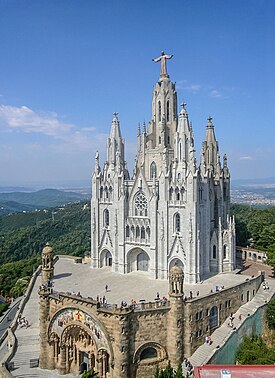Sagrat Cor
| Expiatory Church of the Sacred Heart of Jesus Temple Expiatori del Sagrat Cor Basilica Templo Expiatorio del Sagrado Corazón de Jesús |
|
|---|---|

Entrance of the basilica
|
|
| Basic information | |
| Location | Barcelona, Catalonia, Spain |
| Geographic coordinates | 41°25′19.47″N 2°7′7.9″E / 41.4220750°N 2.118861°ECoordinates: 41°25′19.47″N 2°7′7.9″E / 41.4220750°N 2.118861°E |
| Affiliation | Roman Catholic |
| Year consecrated | 1952 |
| Ecclesiastical or organizational status | parish church, minor basilica |
| Website | www.templotibidabo.info |
| Architectural description | |
| Architect(s) | Enric Sagnier |
| Architectural type | Church |
| Architectural style | Neo Gothic |
| Groundbreaking | 1902 |
| Completed | 1961 |
| Specifications | |
| Direction of façade | S |
| Length | 60 metres (200 ft) |
| Width | 70 metres (230 ft) |
| Spire(s) | 5 |
The Temple Expiatori del Sagrat Cor (Catalan pronunciation: [səˈɣɾat ˈkɔr]; English: Expiatory Church of the Sacred Heart of Jesus, Spanish: Templo Expiatorio del Sagrado Corazón de Jesús) is a Roman Catholic church and minor basilica located on the summit of Mount Tibidabo in Barcelona, Catalonia, Spain. The building is the work of the Spanish architect Enric Sagnier and was completed by his son Josep Maria Sagnier i Vidal. The construction of the church, dedicated to the Sacred Heart of Jesus, lasted from 1902 to 1961.
The idea of building a Catholic church on the summit of the Mount Tibidabo emerged in the late 19th century amidst rumors about the construction of a Protestant church and a hotel-casino at that location. This motivated a "Board of Catholic Knights" to acquire the ownership of the field and give it to Saint John Bosco in 1886, when he was visiting Barcelona at the invitation of Dorotea de Chopitea, a great patron and promoter of the project. From this arose the idea of a building dedicated to the Sacred Heart of Jesus, a dedication very popular at that time thanks to the impetus given by Pope Leo XIII, and following in line with the church built in Rome by Bosco himself (Sacro Cuore di Gesù a Castro Pretorio) and the famous Sacré-Cœur in Paris.
...
Wikipedia
